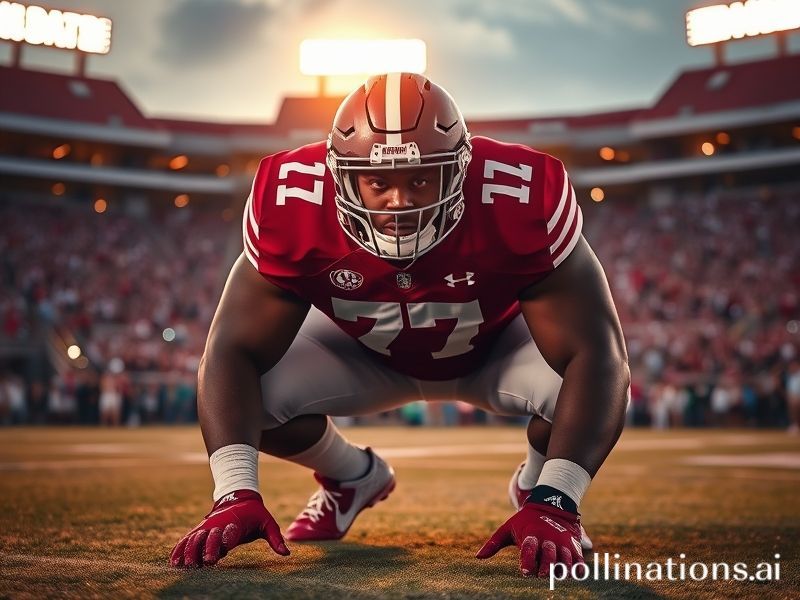Kadyn Proctor: How a 19-Year-Old Offensive Tackle Just Shook Global Economics (and Luxembourg’s Defense Budget)
The Kadyn Proctor Saga, or How a 19-Year-Old Lineman Became a Geopolitical Football
By Dave’s Locker International Desk (Still Recovering from Jet Lag)
In the grand geopolitical chessboard, it’s heart-warming to know that a 6-foot-7, 360-pound teenager from Des Moines can still move more markets, ministries, and message-board moderators than a medium-sized central bank. Enter Kadyn Proctor, Alabama’s freshly flipped offensive tackle, whose January decision to re-pledge to the Crimson Tide after a brief fling with the Iowa Hawkeyes managed to crash servers, trigger an NCAA investigation, and give the phrase “border crisis” a wholesome Midwestern twist.
For readers outside the ecclesiastical province of American college football, think of Proctor as a human trade route—except instead of rare-earth minerals, he traffics in pancake blocks. His initial commitment to Iowa was heralded as a coup for the Hawkeyes, a program historically better known for corn than conquest. Proctor’s de-commitment, followed by his re-commitment, was greeted by Alabama fans the way Swiss bankers greet a numbered account: with silent, reverential greed. The international subplot? Alabama’s offensive line now has more collective mass than the entire standing army of Luxembourg, leading EU defense planners to wonder if NATO Article 5 covers screen passes.
The ripple effects were immediate. In Seoul, futures traders briefly paused their K-pop playlists to short pork-belly prices, calculating that Crimson Tide tailgates alone could shift global demand for smoked meat. Meanwhile in Beijing, sports-apparel counterfeiters began stitching “Proctor 77” jerseys before the ink on his letter of intent was dry, proving once again that intellectual property is a Western delicacy, like gluten-free brioche.
Back in the States, Iowa governor Kim Reynolds convened an emergency “Keep Iowa Nice” summit, a phrase that sounds like a hostage negotiation conducted entirely in passive voice. State economists estimated Proctor’s flip cost Iowa’s local GDP roughly the annual output of a mid-sized Latvian beet cooperative. Somewhere in Riga, a beet farmer sneezed and felt inexplicably richer.
The broader significance, for those keeping score at home, is that recruiting a left tackle has become the closest thing America has to a draft for asymmetric warfare. ESPN’s recruiting industrial complex—worth more than the GDP of Iceland—now employs satellite camps, NIL collectives, and crypto-boosters whose PowerPoint decks look suspiciously like hedge-fund prospectuses. In other words, charming a 19-year-old is now indistinguishable from courting a sovereign wealth fund, minus the pesky human-rights clauses.
And let’s not overlook Name, Image, and Likeness—the NCAA’s polite euphemism for “we finally legalized the black market.” Proctor’s rumored valuation hovers around seven figures, meaning he earns more per pancake block than most UN peacekeepers earn per year dodging actual pancakes in Goma. Small wonder that European football academies, long smug about their socialist wage structures, are quietly studying Alabama’s compliance manual the way Renaissance spies studied Machiavelli.
Still, there’s something darkly poetic about a planet simultaneously on fire and transfixed by a teenager’s fax machine. While Ukrainian tractors tow Russian tanks and TikTok debates whether canned tuna is bourgeois, Kadyn Proctor’s 40-time trends above Tehran’s inflation rate. It’s the sort of absurdity that would make Camus update “The Myth of Sisyphus” to include a subplot about star ratings on Rivals.com.
Ultimately, Proctor’s saga reminds us that in the twilight of the American empire, the most valuable real estate isn’t on a map—it’s between the hash marks. Alliances shift, currencies devalue, but a five-star recruit remains the last universally accepted reserve currency. Someday archeologists will unearth a crimson helmet encrusted with Bitcoin keychains and conclude that late-capitalist civilization worshipped very large adolescents as sun gods. They won’t be entirely wrong.
Conclusion: Whether Kadyn Proctor protects quarterbacks or merely the illusion that any of this matters, his journey from heartland prodigy to trans-Atlantic metaphor confirms a universal truth—when the world goes mad, it drafts a 19-year-old to restore order, or at least sell jerseys. Until the next fax, we watch, we wager, we pretend the stakes are anything more than a glorified scrimmage on a burning field. Roll tide, roll credits.







